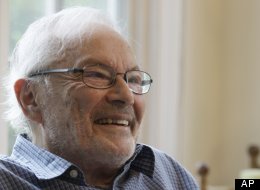Maurice Sendak
Many years ago, I was up for the gig of adapting Where the Wild Things Are to the big screen, and I had the chance to talk to Maurice Sendak on the phone for two and a half hours.
It was one of the most thrilling experiences of my life, because in spite of being a much older man with an infinitely greater impact on world culture, Sendak and I had an immediate rapport and instantly talked like two old friends. I imagine many people have similar stories about him. He saw me, the both of us I guess, as adventurers in the artistic wilderness. He didn’t like rules, he had no patience with commerce, he was utterly unconcerned with the demands of the marketplace. He was a pure artist, a man of vision who did what he wanted, damn the consequences, and made the marketplace bend to his will.
To a screenwriter, an encounter like that is like heroin. The screenwriter spends his entire life in compromise, putting himself out there day after day, doing his best to make his voice heard, only to be told, a hundred times a day in a hundred different ways, that his voice is subservient to the studio executive, the marketing department, the producer, the director, the cast, the special-effects crew, the production designer, the product-placement people, and so on.
We talked about Walt Disney. I told Sendak that I thought Bambi was Disney’s artistic peak, Sendak said he placed it at Pinocchio. “Bambi is where he went wrong,” he said. “Bambi is where the cute animals took over. I liked Mickey Mouse, the early ones. That guy was a rat-nosed bastard.”
We talked about Samuel Beckett. Sendak loved his plays but had never read his prose. I told him I greatly preferred his prose and suggested a short story collection as a point of departure. I don’t know if he ever took me up on the recommendation, but I was gladdened that an artist with nothing left to prove to anyone was still curious and still looking for inspiration, still eager to learn.
Sendak told me he had only one demand for my (hypothetical) adaptation of Where the Wild Things Are. “All I ask,” he said, “Is that the movie be as revolutionary today as the book was in 1962.” Those are terrifying and liberating words for a screenwriter to hear. On the one hand, you’ve got a great author telling you that you are free to do anything you want, and on the other hand, you know that the word “revolutionary” is in the studio’s mind exactly nowhere.
I laughed. I said “I totally agree with you, that’s what the movie should be. The way that your book threw out every expectation of what a children’s book should be, that’s what the movie should do. It should boldly, recklessly experiment with form, it should deal with dream and metaphor, it should take penetrating psychological insight and present it as messy, wild comedy. But I gotta tell you, there’s no way a studio is going to spend $100 million on that movie.”
“That’s okay with me,” he said. “I don’t need the money, I don’t need the hassle, and I don’t need a movie made of Where the Wild Things Are. And if no movie ever gets made, I’m perfectly okay with that. These are my conditions.”
Loved that guy.
